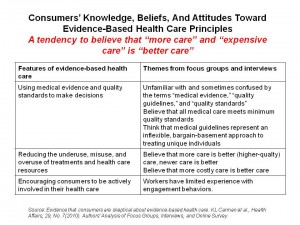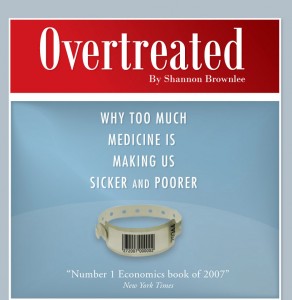 More health care is better health care, and the more expensive it is, the better it is. That’s a key finding by researchers who found that American consumers are skeptical about evidence-based health care, published in a study in Health Affairs on June 3, 2010, Evidence That Consumers Are Skeptical About Evidence-Based Health Care.
Consumers will face a long journey as they morph into evidence-based health decision makers.
Evidence-based health care includes shared decision making, comparative effectiveness research, evidence-based benefit design, and transparency of cost and quality information, based on the researchers’ definition. “If consumers don’t understand” evidence-based health, “or if they see it as an invalid basis for making decisions about providers and treatments, the most ambitious goals of” health reform may fail, the paper predicts.
Consumer engagement in health is a precursor to bending the cost curve and achieving optimal health outcomes: patients on chronic care medications stick to prescribed drug regimens when they’re engaged, they seek care earlier when they feel ill, and they’re more satisfied with their health care.
However, there’s a chasm between best-practice evidence-based care and how consumers tend to define quality health care, as expressed in the chart. There are many gaps in consumers knowledge, including fundamental definitions for the terms “medical evidence,” “quality guidelines,” and “quality standards.” Instead of appreciating the value of health care based on what’s worked, consumers tend to believe that all care meets minimum quality standards, and that more expensive care equals “better care.”
The goal of this research was to gain learnings for a consumer communication toolkit that will be developed to aid employers who sponsor health insurance to help arm their insured employees in becoming more effective health consumers. The research was conducted by a team from the American Institutes for Research, California HealthCare Foundation, McGee and Evers Consulting, and the National Business Group of Health.
Health Populi’s Hot Points: These beliefs and values underpin how consumers engage with the health system, and compromise the nation’s ability to re-engineer the health system and relationships between health citizens, providers, and medical goods and services. There is today a small cadre of health citizens who ‘get’ evidence-based concepts in health people who are very engaged, involved with information, and forcing change in their relationships with providers when they can. This early adopter segment of uber-health engaged people can influence
More health care is better health care, and the more expensive it is, the better it is. That’s a key finding by researchers who found that American consumers are skeptical about evidence-based health care, published in a study in Health Affairs on June 3, 2010, Evidence That Consumers Are Skeptical About Evidence-Based Health Care.
Consumers will face a long journey as they morph into evidence-based health decision makers.
Evidence-based health care includes shared decision making, comparative effectiveness research, evidence-based benefit design, and transparency of cost and quality information, based on the researchers’ definition. “If consumers don’t understand” evidence-based health, “or if they see it as an invalid basis for making decisions about providers and treatments, the most ambitious goals of” health reform may fail, the paper predicts.
Consumer engagement in health is a precursor to bending the cost curve and achieving optimal health outcomes: patients on chronic care medications stick to prescribed drug regimens when they’re engaged, they seek care earlier when they feel ill, and they’re more satisfied with their health care.
However, there’s a chasm between best-practice evidence-based care and how consumers tend to define quality health care, as expressed in the chart. There are many gaps in consumers knowledge, including fundamental definitions for the terms “medical evidence,” “quality guidelines,” and “quality standards.” Instead of appreciating the value of health care based on what’s worked, consumers tend to believe that all care meets minimum quality standards, and that more expensive care equals “better care.”
The goal of this research was to gain learnings for a consumer communication toolkit that will be developed to aid employers who sponsor health insurance to help arm their insured employees in becoming more effective health consumers. The research was conducted by a team from the American Institutes for Research, California HealthCare Foundation, McGee and Evers Consulting, and the National Business Group of Health.
Health Populi’s Hot Points: These beliefs and values underpin how consumers engage with the health system, and compromise the nation’s ability to re-engineer the health system and relationships between health citizens, providers, and medical goods and services. There is today a small cadre of health citizens who ‘get’ evidence-based concepts in health people who are very engaged, involved with information, and forcing change in their relationships with providers when they can. This early adopter segment of uber-health engaged people can influence  later adopters, the paper concludes.
Social networks have been growing in number and value for several years; see my paper, The Wisdom of Patients, to learn more about this phenomenon. But social networks and person-to-person influence alone won’t solve the challenges of (1) getting the health un-engaged to engage, and (2) educating the public-at-large on the meaning and importance of evidence-based medicine and health care.
The researchers’ objective is to arm employers and unions with a communication toolkit that will help people understand quality health care and empower people to engage in that care. There’s a missing link: that is, what’s going to motivate people to engage? There’s heavy lifting here: it’s going to take information, yes; tools, via the channels and media that people want to use which could include games, health risk appraisals, videos, chat rooms, and many other formats; and, some creative value-based benefit designs that help nudge people toward engaging in health and making better health decisions, every day.
Getting Americans to downsize better yet, “rightsize” their expectations of health services is the heaviest lifting of all. Take a page out of Shannon Brownlee’s brilliant tome, Overtreated, and you’ll understand the magnitude of the challenge.]]>
later adopters, the paper concludes.
Social networks have been growing in number and value for several years; see my paper, The Wisdom of Patients, to learn more about this phenomenon. But social networks and person-to-person influence alone won’t solve the challenges of (1) getting the health un-engaged to engage, and (2) educating the public-at-large on the meaning and importance of evidence-based medicine and health care.
The researchers’ objective is to arm employers and unions with a communication toolkit that will help people understand quality health care and empower people to engage in that care. There’s a missing link: that is, what’s going to motivate people to engage? There’s heavy lifting here: it’s going to take information, yes; tools, via the channels and media that people want to use which could include games, health risk appraisals, videos, chat rooms, and many other formats; and, some creative value-based benefit designs that help nudge people toward engaging in health and making better health decisions, every day.
Getting Americans to downsize better yet, “rightsize” their expectations of health services is the heaviest lifting of all. Take a page out of Shannon Brownlee’s brilliant tome, Overtreated, and you’ll understand the magnitude of the challenge.]]>
Getting Americans to "right-size" health care: understanding evidence-based medicine
By Jane Sarasohn-Kahn on 3 June 2010 in Bio/life sciences, Health Consumers, Health Economics, Health Quality, Health reform, Health regulation, Health social networks, Pharmaceutical




 Thank you, Trey Rawles of @Optum, for including me on
Thank you, Trey Rawles of @Optum, for including me on  I was invited to be a Judge for the upcoming
I was invited to be a Judge for the upcoming  For the past 15 years,
For the past 15 years,